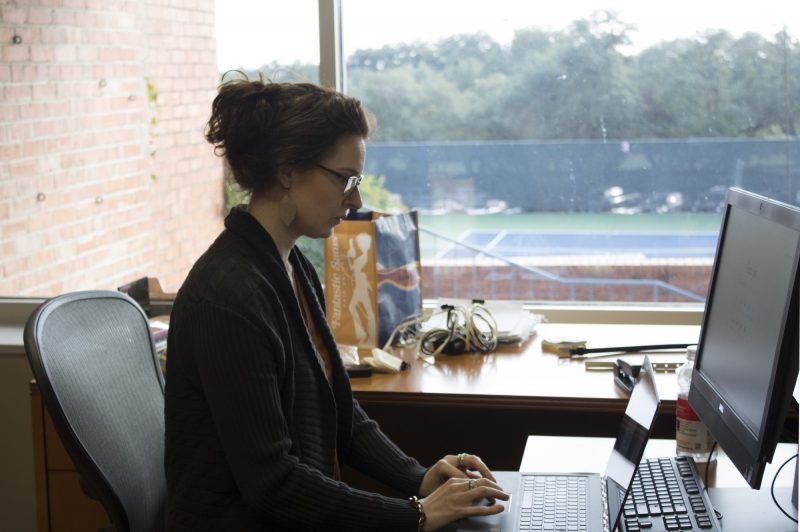The fall semester of 2018 marks the fourth year of Trinity’s transgender student support group, which meets every other Wednesday. Originally co-facilitated by Richard Reams, associate director of Counseling Services, and Amy Stone, associate professor of sociology and anthropology, this group offers a space for trans and nonbinary students to share their experiences.
“About four years ago, I [became] aware that finally at Trinity there was a substantial number of trans and nonbinary students. I thought, ‘Let’s provide an opportunity for students to get together and talk about their gender journeys, challenges that they’ve faced, give them the opportunity to share their stories and support each other and see if there’s enough interest,’ ” Reams said.
During the group’s meetings, students discuss a variety of topics.
“Sometimes a student will bring a question to the group. Maybe it’s about hormone therapy or voice training, and what kinds of resources there are, or what experiences people have had with something,” Reams said. “We’ve also talked about things like housing at Trinity and experiences in housing.”
Reams said that meeting attendance typically varies from three to eight students, but 11 individual students have participated this semester.
One of the group’s newer members shared how they found out about the group and how it helped them accept their nonbinary identity.
“I have a friend who is part of [the support group], and I had opened up to them months ago about the questioning I’d been going through. In August or September … they encouraged me to email Dr. Reams to see if I could attend,” a student, who asked not to be named and has not come out as nonbinary yet, said.
The student was surprised by the group’s welcoming atmosphere.
“I was really apprehensive about going to the first meeting, because at the time I was using the pronouns I was given at birth, and I still don’t plan on changing my name or my [gender] presentation,” the student said. “But [the members] were really supportive and kind … I’ve continued growing and exploring other parts of myself since then, and they’ve supported me all the way.”
According to Reams, the opportunity to bond with understanding peers makes this group important for students.
“It’s meaningful for people to have a supportive environment with others who really understand what it is to live as a person who’s not cisgender and [who] may not experience gender as being binary, to experience understanding, empathy and support,” Reams said.
Reams spoke about the current presidential administration’s recently proposed national policies, which — if put into place — would define sex and gender as immutable at birth and have serious implications for how Title IX is interpreted and enforced.
“The assault on trans rights and equality is truly appalling and distressing,” Reams said.
However, Reams has faith that these policies will not affect Trinity.
“I would call your attention to the recently launched transgender policies and resources web page that I have been working with others on developing for a year and a half and that affirms that Trinity will continue to be an inclusive and equitable place,” Reams said.
Stone, who co-facilitated the group with Reams for the first three years, is on academic leave; Wendy Apfel — instructional support manager of Information Technology Services — currently co-facilitates the group, and Elizabeth Rahilly — visiting professor of sociology — will co-facilitate the group next semester.
Rahilly has not facilitated a trans support group before but is committed to supporting trans groups on campus. Rahilly’s academic work centers largely around gender.
“My entire background in sociology is invested fundamentally in unpacking normative expectations for sex, gender, identity and the body,” Rahilly said. “Shaking the foundations of normative gender binary ideology is at the root of my own scholarship and in turn my approach to students, teaching and course material.”
Rahilly spoke about her role as co-facilitator of the group.
“I’m there to be an informed facilitator of the issues that they need to talk about because I think that these groups are an important source of community and empowerment,” Rahilly said. “I would never presume myself to be an expert: I think it’s always about deferring to the person’s own experience and identity and awareness, and that’s very much the approach I will take.”
Rahilly will help co-facilitate a Trinity PRIDE meeting on Nov. 14, which is focused on the experiences of trans and nonbinary students.
“We originally envisioned [the meeting] as a space for self-care, [as a way] for trans and nonbinary students to learn how to channel some of the frustration that they are experiencing in this difficult time into productive and healthy behaviors and how to address transphobia when they experience it on a national and micro-level,” Chiara Pride, junior and president of PRIDE, said. “I hope that it is a safe space where people can feel comfortable to express their concerns and have those concerns heard and responded to with kindness and education.”
Students who have questions about the transgender support group and/or would like to attend a meeting can email rreams@trinity.edu or wapfel@trinity.edu.






